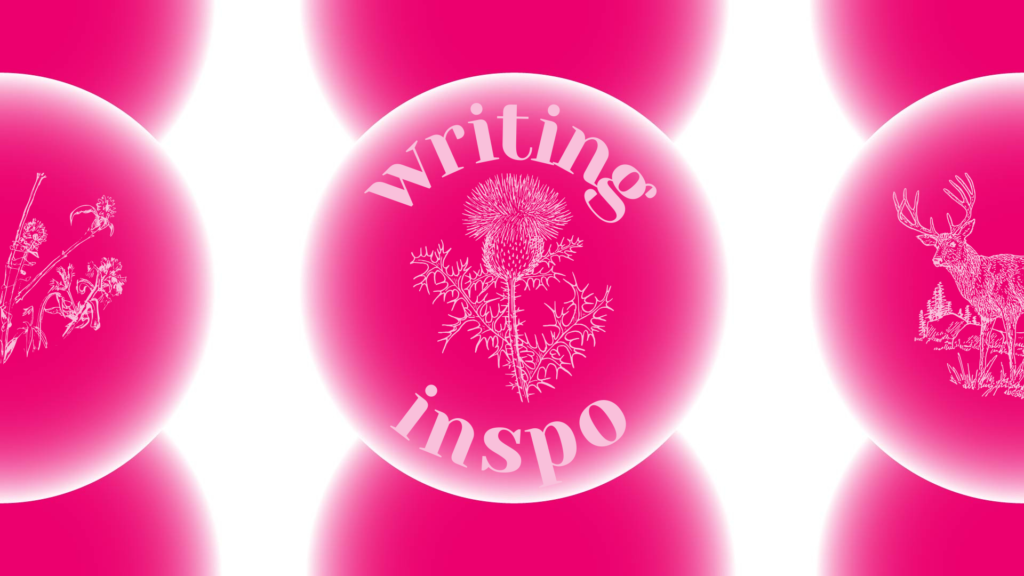I’m guessing you’re here because of writer’s block? It’s okay; it happens to the best of us. Breaking out of that emptiness is easier than you might think! Like art, inspiration is all around us. We first need to become aware of it before we can soak up all its goodness. In this article, I want to share my best sources of inspiration that helped me overcome a repetitive and slow writing slump. These inspirations stir creativity by encouraging commentary and understanding of human behavior, making your storytelling as authentic as possible.
Table of contents
How To NOT Get Inspired
First things first, I recommend not looking into other literary works for the purpose of getting inspired. In fact, it’d be better to say I anti-recommend it. If you’re going to read a book or start a new show, let it be because you want to learn its technical style/format or simply enjoy the entertainment media itself. Because when you start a book/show to begin or continue your writing process, you’ll see that you’re either just distracting yourself or loosely basing your work off it. And if you’re anything like me, you’re terrified of copyright and legality issues!
Instead, think of your favorite writers and producers. What were they inspired by? The Hunger Games is cool and all, but think about where Suzanne Collins got her inspiration to write this dystopian trilogy. Real-life war (Sparknotes). What about the Titanic? Real-life tragedy (Tyler). The Truman Show? It was inspired by the life of Michael Jackson (Schedeen). What did these writers and directors have to say about war, tragedy, and media? Authentic inspiration comes from deep thinking and commentary.
Think about what commentary you have regarding the information and content you consume if you decide to go through the anti-recommendation route. I guess it can’t be so bad as long as you are responsible. But if you decide you want more sources of meaningful inspiration, I’m here to offer you the best and most influential methods!
How To Get Inspired Authentically
Education
Every now and then, I think about dropping out of college. Despite not liking school very much, education is so undeniably valuable. Not only is it useful for job searching, but it can also enhance your creative work. Our world is a story itself — just with no specific protagonist. Actually, you could consider humanity the protagonist. I think that’s really cool.
Think of the core subjects in school, especially… science! Did you expect me to say something like history? Well, let me tell you this: almost all academic disciplines are sciences. Science is a huge umbrella term for many studies, including formal sciences (math, data, computer science), natural sciences (biology, physics, geology), and social sciences (history, psychology, government). I’ll focus more on the latter, as I found my psychology and history classes the most valuable when I began writing creative fiction in my own time. The natural sciences can also be very useful in your writing, but it might depend on your genre and setting.
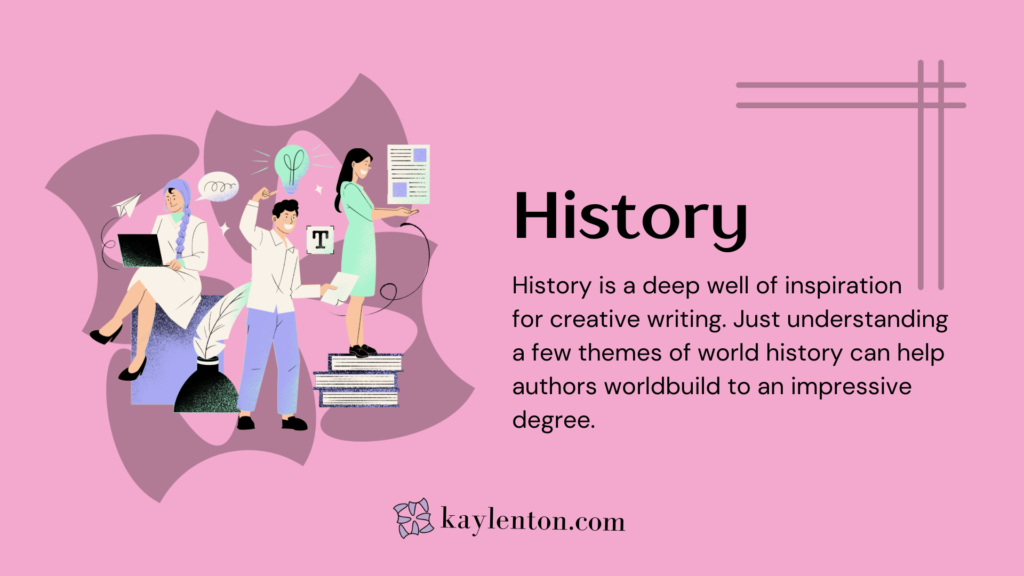
History helps you understand human nature and society. This is because it essentially documents and studies human experiences over time. It has witnessed the evolution and interactions of human civilization, cultures and religions, technology, economics, politics, etc. Because of this, knowledge of world history can help authors world-build.
From ancient civilizations to modern-day societies, history offers inspiration for your settings, characters, and plots. Consider deities, historical figures, revolutions, wars, discoveries, and social movements—these can all be reinterpreted and adapted into your novels. Think about cause and effect, continuity, and changes over time to add depth and realism to your work.
No one owns historical events, so you can’t be penalized for taking inspiration from them. However, it’s important to approach this with care and respect. Many people strongly resonate with their cultures, religions, and homelands. When incorporating these aspects into your worldbuilding, educate yourself to avoid inaccuracies and disrespect. This ensures your work is both thoughtful and respectful. While taking inspiration from the real world, aim to create something that feels authentic and engaging, whether you’re being historically accurate or fictionalizing elements.
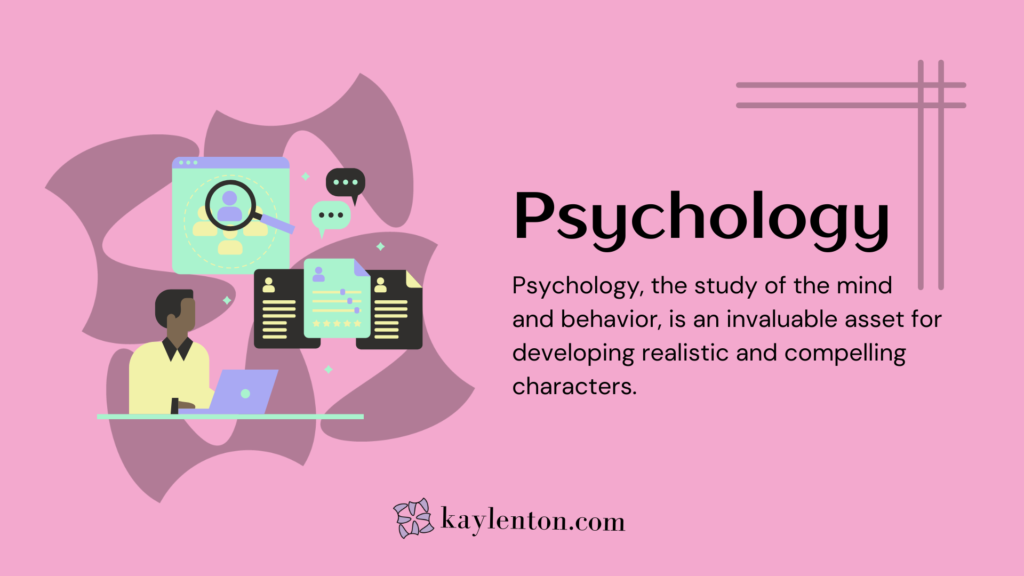
Knowing psychology can be the best tool helping you craft and write characters. That is because we are writing about living beings, aren’t we? I’m so glad I took my psychology notes on online documents rather than a physical notebook — since I force myself to discard those at the end of the year to avoid becoming a hoarder. I want to share with you some cool concepts that can enrich your writing. Best part is, it’s all real information — making your story closer to reality. I’ll try to cover each topic briefly.
Beginning with motivation, Maslow’s Pyramid covers our hierarchy of needs.
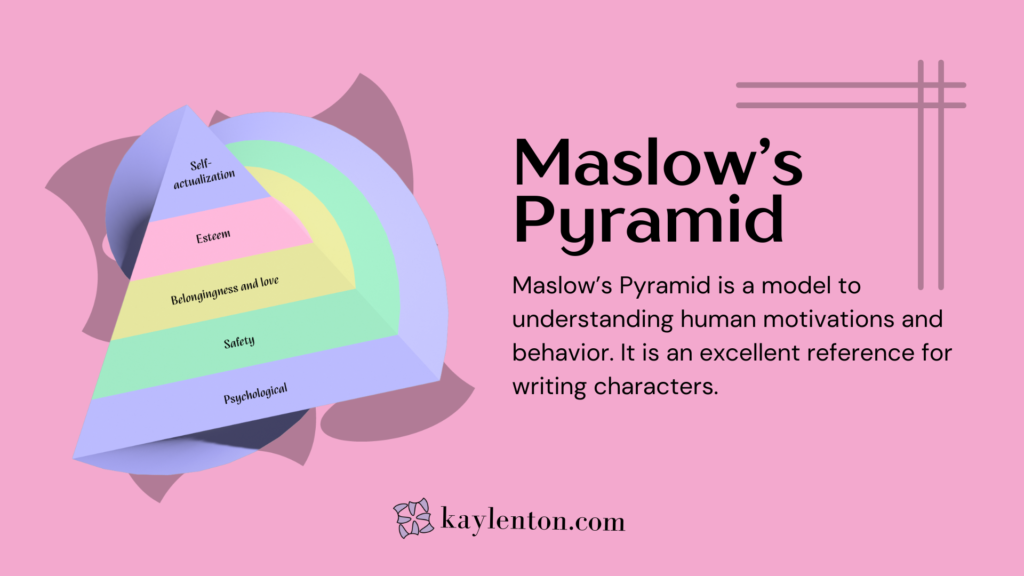
The lower levels of the pyramid take priority over the higher levels of the pyramid. Consider them the foundation and most important to our state of living. Thus, we start at the bottom of the pyramid: our psychological needs, which includes food, water, clothes, shelter, etc. You know it — the essentials. Once those needs are fulfilled and secured, we move up the pyramid to the need for feeling safe, stable, and secure. This includes not having to wonder where your next meal comes from, having a stable income and job, a plan for emergencies like drills, health and dental insurance, car insurance, etc. Parents should be covering these for their children. Next is the need to feel like you belong and are loved. Humans are social beings, and it is natural that we experience attachment and pain from being shut out. Banding together increased humanity’s chances at survival in an evolutionary aspect. Above that is esteem needs, which covers feelings such as confidence, respect, and independence. Finally, at the top sits self-actualization — which refers to reaching our full potential and becoming the best version of ourselves.
Notice how natural desires like sex and having a family aren’t included here? I’m not saying everyone needs to have a desire to have children! It was just one criticism of Maslow’s pyramid that I remember. There are a few. So, don’t take it all as law; it’s a theory. It’s just neat being able to visualize all human needs, whether or not it actually takes priority like the pyramid or not.
You might be asking, “How does this inspire me?” Understanding human motivations helps you write realistic characters more naturally. Every important character needs a reason for why they exist in the plot and why they keep moving. This reason is often to meet a need—whether it’s physiological, safety, love, or esteem. Consider where your character is on Maslow’s pyramid then determine their next steps. Aim higher! Also, think about which of these needs your character may be lacking. If they are constantly disrespected or ostracized, think about how this can affect their character arc.
A recent battle Shonen manga/anime series that goes off this hierarchy of needs is Chainsaw Man. Without massive spoilers, it follows a teenager named Denji, who is burdened by a massive debt left behind by his late father. He talks of his big dreams, which are eating bread with jam then forming a romantic bond with a girl. When offered secured housing and food, he agrees to be a woman’s pet. I’ve only read through part 1, but let me tell you this: it’s really good! Warning though, it includes gore and partial nudity.
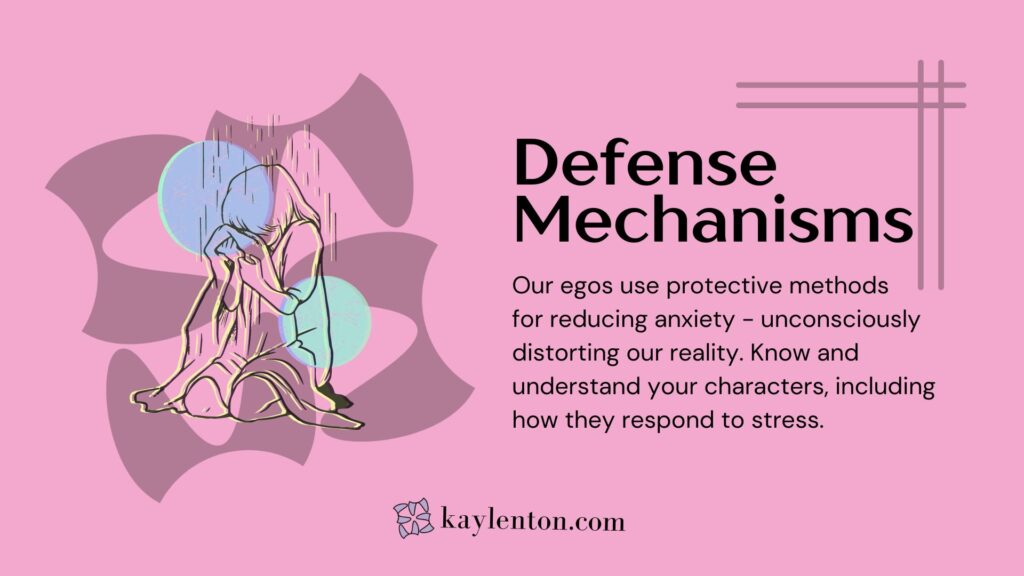
It is animal instinct to survive, and that includes avoiding negative feelings that may cause us to kill ourselves. Here are just 8 of the more well-known defense mechanisms:
- Denial — Refusing to accept facts and realities.
- Projection — Attributing one’s own traits and impulses to others.
- Repression — Pushing uncomfortable thoughts away from conscious awareness.
- Regression — Retreating to a more infantile developmental stage.
- Rationalization — Creating logic or excuses to justify unwanted feelings.
- Reaction Formation — Acting in a manner opposite to one’s true feelings.
- Displacement — Redirecting impulses from a threatening object/person to a less threatening one.
- Sublimation — Channeling unacceptable behaviors into more socially acceptable and productive activities.
You know those movies where friends, lovers, or colleagues go on a dangerous trip and one dies while the other hallucinates their presence to avoid feeling scared and alone? Yeah, that’s denial. Examples include Fall (2022), Adrift (2018), and Gravity (2013).
Many of these defense mechanisms can be seen as character flaws and/or abusive traits. I hope some of the defense mechanisms will inspire you to create complex characters. You can even understand the pattern of how they think and act; keep it consistent with their character. Get writing!
Some other psychology concepts that might pique your interest include human development, conditioning (learning), and nature vs. nurture.
Music
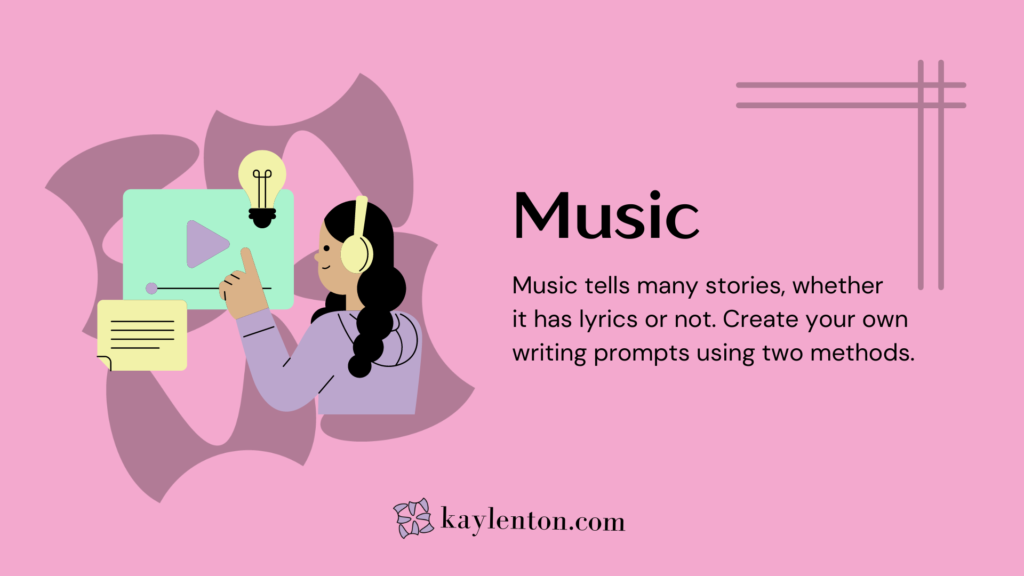
While I recommend avoiding other literary works to prevent unintentional copying, music is a different story. (Is that a pun? Should I say pun intended? HAHA!) I want to share with you two ways of listening to music to get you into the writing mindset.
This first method is passive. Don’t we all love passive productivity? Well you have to put it to work first — by turning on that instrumental, lyricless song. Some good picks are the soundtracks that are a part of your favorite films and shows. Remember, it should be lyricless! This way, we exercise our mind to pick up on the mood of the music and how it makes us feel.
Here are two soundtrack albums I enjoy and use during my writing time. Parasite and Squid Game both have thriller dystopia plots.
The second method is looking into the lyrics of some songs you vibe with. Don’t choose one that you already know by heart! Though I believe no one doesn’t benefit from a second read/listen, you’re too familiar with it. Choose another song that you like the vibes of. In my case, I have a bunch of Japanese, Korean, Vietnamese, and Chinese music that I have no clue what the artists are singing. I’d choose those to look up the lyrics of and analyze over the American pop that I already know and can pick up the meaning quite passively and easily (I’m an attentive listener).
What are we looking for in these lyrics? We’re diving into the storytelling within the song, dissecting the emotions, themes, and messages conveyed. This process helps us exercise our interpretation skills and prompts us to think critically about the story behind the lyrics. Sometimes, the mood of a song contrasts with its content in a way that’s poetically inspiring, sparking unique story ideas and character arcs.
What are we looking for in these lyrics? We’re diving into the storytelling within the song, dissecting the emotions, themes, and messages conveyed. I encourage you to imagine your own original characters into the setting and scenario of the song. You can make any changes however you like. Dissecting the meaning of the lyrics sharpens your media literacy. And by incorporating your imagination, you can create a unique perspective from a singular song.
You can take this a step further by looking into the cohesive atmosphere of an entire album or EP. How does it ascend the listener and tone it back down? Additionally, consider how fans and music critics interpret the sounds and compare their perspectives with your own.
Conclusion
When I first started out writing, it all stemmed from a rage I had about female characters being done wrong in non-western entertainment media. To lengthen it, I divided it into very repetitive arcs. Thinking back now, I was such a noob writer. You really do get better as you write — and I mainly thank my world history and psychology classes for that.
Ultimately, education and music are such accessible sources for inspiration. Wait, I take the education part back. Unfortunately, education is very expensive. But for what can and will help your creative writing, there are several free sources online. It’s not about being a rocket scientist. We are humans, observers, and writers! Use academic topics (especially in social sciences), art forms (like music), and your own life experiences as writing prompts. You’re assigned a topic, feeling, or experience. I hope it helps you with your writing as much as it helps me with mine!
References
SchedeenJune 4, Jesse, and 2018-4 Min Read. “11 Things You Never Knew about Jim Carrey’s “the Truman Show.”” Moviefone, www.moviefone.com/news/the-truman-show-jim-carrey-movie-trivia/. Accessed 16 June 2024.
“SparkNotes: The Hunger Games: Context.” Sparknotes.com, 2012, www.sparknotes.com/lit/the-hunger-games/context/.
Tyler, Adrienne . “Titanic True Story: How Much of the Movie Is Real.” ScreenRant, 2 Jan. 2021, screenrant.com/titanic-movie-true-story-jack-rose-real-fake/

